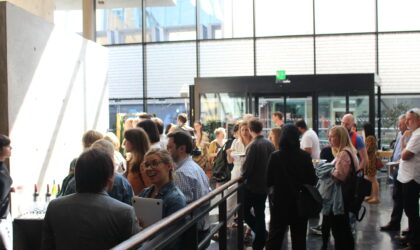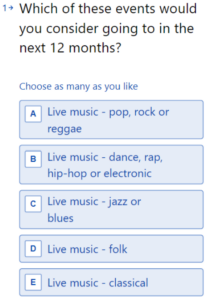
Beginner Read Audience Data Collection and Evaluation
Audience research is the process of gathering information about the people who visit you or see your work, use your services, or engage with your organisation.
In this article
There are many different types of audience research projects. In this article we’re going to take a look at a few types of research projects that creative and cultural organisations and individuals might carry out, and the research objectives that underpin them.
We’ll cover the following project types:
If you’re new to audience research, you might first want to check out our introduction to the topic here.
The most common type of research in the cultural and creative sector is to carry out visitor or audience surveys with people who visit or engage with you, usually at the end of, or after their visit or interaction. This allows you to monitor key statistics about your audience; what they thought, how they heard about you and what prompted the visit, as well as any Key Performance Indicators (KPIs) that you might have set as an organisation.
Typically, visitor surveys will be part of an ongoing project. Comparing how data changes over time or with different shows or pieces of work allows you to conduct evaluations and help make decisions.
If you’re looking for a few tips to boost the effectiveness of your visitor surveys, check out our handy guide here.
For pieces of work, exhibitions, shows, events, or seasons of programming, you might carry out an evaluation specifically focused on it to find out how successful it was, and to apply any learnings to future works. You may have to conduct an evaluation if programming was supported by outside funding, or similarly, for a major funded project such as an infrastructure upgrade or rebranding.
There’s no one-size-fits-all approach to evaluating specific works and projects – it might involve visitor surveys, or interviews with stakeholders in your organisation and partners. It might involve looking at commercial metrics, such as sales, visitor numbers, website analytics and so on. Most evaluations will draw together multiple streams of data and methodologies to answer different questions and give a comprehensive picture.
Your funders may have templates, guidelines or support to follow for evaluation. If you are evaluating for your own purposes, you may want to look at case studies elsewhere or chat to people in your network or the Digital Culture Network for inspiration and guidance.
Visitor surveys and evaluations are usually summative in nature, i.e. they measure things that have happened, although you can also include questions about upcoming work to gauge interest.
Many organisations will also undertake dedicated audience or market research that is formative, for example concept testing for upcoming exhibitions or shows.
Concept testing may trial ideas for the narrative or main idea for an exhibition, or the interpretation and content. Or it might focus on the visit experience, wayfinding, staff interactions and accessibility. It’s most often used to test ideas for marketing – showing different poster campaigns and visuals, or messages.
This kind of research might focus on a few key audience segments that have been identified for growth or retention. By finding out which ideas, words and images resonate most with audiences, organisations can take a forward-looking approach and adapt or develop their new exhibitions, work and messaging in response to the findings.
Sometimes, organisations will carry out market testing to identify potential audiences. Rather than only surveying current audiences, market testing will typically survey a representative snapshot of the wider population within the geographic reach of an organisation.
You might have some screening criteria to make sure that respondents are in the market for your artform or service. If they’re not, you can end the survey for them. These screen-outs are still captured so you can see what percentage of the general public are potentially interested in your offer, and the profile of those who are and are not in your market.

By identifying your market and surveying current and potential audiences, you can test awareness and visitation of your organisation against others and identify groups of people who you could target as new audiences, finding out what kind of content and messaging resonates with them. This kind of study can also help to make sense of, or help to identify groups for your audience segmentation – perhaps combining Quantitative and Qualitative approaches to identify data trends and then explore them more deeply.
When considering branding, or reviewing strategy, cause and vision, an organisation may undertake some research to help navigate this process. That might include a market study as described above, but there are often more strands to these kinds of evaluations.
It may include internal-facing data collection too: interviews, workshops and activities with people within the organisation, stakeholders and other partners, as well as workshops or in-depth conversations with representatives of the audience.
This can be useful – bringing together many people across different disciplines and roles within the organisation can lead to better awareness of issues and opportunities with conversations that may not normally happen in the daily flow of work. These kinds of projects often benefit from brand and strategy consultants to bring an outside perspective and help to find and refine the most important ideas.
In the next article, Data Collection Methodologies for Creative and Cultural Audiences, we’ll move on to the types of data collection methods that are available and what each one is best suited for.
If this sparks any ideas, or you’d like some guidance, support, or a sounding board on your audience research project or other topics, the Digital Culture Network offers dedicated, free 1:1 sessions with our Tech Champions – book in a slot with us.
Beginner Read Audience Data Collection and Evaluation
Audience research is the process of gathering information about the people who visit you or see your work, use your services, or engage with your organisation.
Beginner Read Audience Data Collection and Evaluation
Audience surveys are a valuable tool for organisations that want to learn more about their target audience. These top tips should help you focus on what matters and get results.
Beginner Read Audience Data Collection and Evaluation
This article takes a deeper dive into the different methods for fieldwork and data collection to support these studies, and which ones are useful for different research objectives.
Beginner Read Audience Data Collection and Evaluation
Audience research is the process of gathering information about the people who visit you or see your work, use your services, or engage with your organisation.
Beginner Read Audience Data Collection and Evaluation
This article takes a deeper dive into the different methods for fieldwork and data collection to support these studies, and which ones are useful for different research objectives.
Beginner Read Audience Data Collection and Evaluation
Audience surveys are a valuable tool for organisations that want to learn more about their target audience. These top tips should help you focus on what matters and get results.

